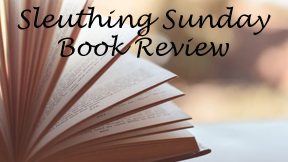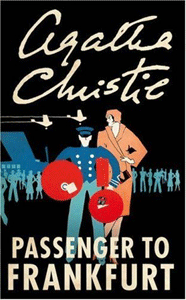In the Twenties, Agatha Christie showed she could competently write puzzle mysteries in the vein of Arthur Conan Doyle and the established masters. In the Thirties she mastered plotting; in the Forties she mastered character; in the Fifties and Sixties she tried new twists on her formulas, mostly with success.
As the calendar turns to the futuristic year of 1970, she tries to write a broad-minded spy novel without emphasizing plot or character, and it ends up being her worst book to this point: “Passenger to Frankfurt.” I suspect she didn’t plan the novel in advance. It reads like stream-of-consciousness.
Silly spies
In the many fireside chats among “Passenger’s” movers-and-shakers in the worldwide spy game, the players speak like they themselves are casual observers, rather than in the thick of it.

“Passenger to Frankfurt” (1970)
Author: Agatha Christie
Genre: Spy adventure
Setting: London and other locations, 1970
Ultimately, they find proof that a movement of the world’s disaffected youths has coalesced in South America. They make one last play to unleash a wonder drug that an old scientist – introduced in the latter pages – might have stashed away. This drug will make the youths benevolent instead of violent, and the Establishment will be preserved, the world saved.
Christie seems mildly aware “Passenger to Frankfurt” is ridiculous. This book includes a rare introduction, and she says the novel should be read as a “fantasy.” I wonder if deep down she knew how bad “Passenger” is. One year earlier she wrote “Endless Night,” so it’s not like she had lost her faculties at age 80.
Rather, she tried something different and failed; but then, why did she go forward with publishing it? She’s not usually a “Throw it at the wall and see what sticks” type of author.
In going for a fantastical tone, Christie sometimes tries for humor in the dialog, but none of it lands – not a single line. The good-guy side in this shadow-government war has fellows who speak in cheeky, playful (and utterly unlikely) fashion. As always, Christie admires these types of people, but here she doesn’t understand them.
Stafford Nye, the laid-back spy
The almost-exception is Sir Stafford Nye, a career low-level British diplomat who gets recruited into the good-guy shadow government. They think his casual attitude toward everything will make him a good chess piece to send into the game, since no one will suspect him.
We do get one well-written chapter where Nye meets the female Jabba the Hutt-like “Big Charlotte,” a German member of the bad-guy shadow government. She has her toes in oil, arms, finances – and she’s likely funding the worldwide youth rebellion (for the vague reason of being evil).
But then Christie unfortunately abandons Nye for several chapters. Nye has adventures off-page while we instead listen to many shadow-government chats, then we catch up with him at the end, after the plot (such as it is) has been resolved.
As with a lot of Christie’s world-hopping adventures, the man has a mysterious female companion; here she is Mary Ann, a.k.a. Countess Renata Zerkowski. The difference, at first, is that they aren’t to be a love match. Nye notices that Mary Ann resembles his late sister – so much so that he goes to his aunt’s house to look at portraits. There he finds Mary Ann is a dead ringer for a relative from generations ago.
A mystery is established: What is Mary Ann’s familial relationship to Nye? But Christie drops it: They do end up a love match in the end, their resemblance in features forgotten by Nye (from whose perspective we experience the story, when he’s on the page).
A core misunderstanding
With plotting and characterization of little interest to Christie, “Passenger” is a theme novel, but the themes are messy. Christie has always admired the good-guy spy state, and always feared the bad guys in the shadows, dating back to 1927’s “The Big Four” (the previous standard bearer for “worst Christie novel”).
In her mid-career spy novels like “The Patriotic Murders,” “They Came to Baghdad” and “Destination Unknown” (which some readers loathe, although they are masterpieces compared to “Passenger”), the villains are generally Communists.
Here, they are “an anarchist minority that wants to rule.” Throughout “Passenger,” Christie misunderstands the definition of “anarchy” — the belief that individuals are better off without government.
Anarchy doesn’t include a belief in violence or anti-violence, but Christie takes for granted that violence is automatically part of anarchy. This is a common misconception, but I think a widely published author should know better. The opposite is actually the case: Government requires violence, or at least the promise that violence will ultimately be delivered on those who don’t fall in line.
Christie often uses “anarchy” interchangeably with what she is truly describing: a resurgence of the “master race” principles of Nazism. A simple editing pass could’ve fixed this problem, but I question whether this novel was edited.
A peek into Christie’s mind
“Passenger to Frankfurt” is an excellent document for illustrating Christie’s deep-seated fear of what the world would be like without the Establishment. It had been suggested throughout her body of work, but she cuts loose with it here.
The novel is intellectually fascinating – indeed, crucial — if someone were writing a Christie biography with only her fictional writings to draw from.
To compare, “The Big Four” is blandly bad, and “Passenger” is spectacularly bad. It leads to a conundrum when ranking the dregs of Christie’s catalog: Gun to my head, which would I rather read? “Passenger” has more meat on its bones, but it is rotting meat. “The Big Four” is a tad weaker at defining its villains and it’s never for a moment plausible, but at least has Poirot and Hastings.
I think “Passenger to Frankfurt” is slightly worse overall. But if I had to read either of them again, I’d ask for the bullet.
Sleuthing Sunday reviews an Agatha Christie book or adaptation. Click here to visit our Agatha Christie Zone.


